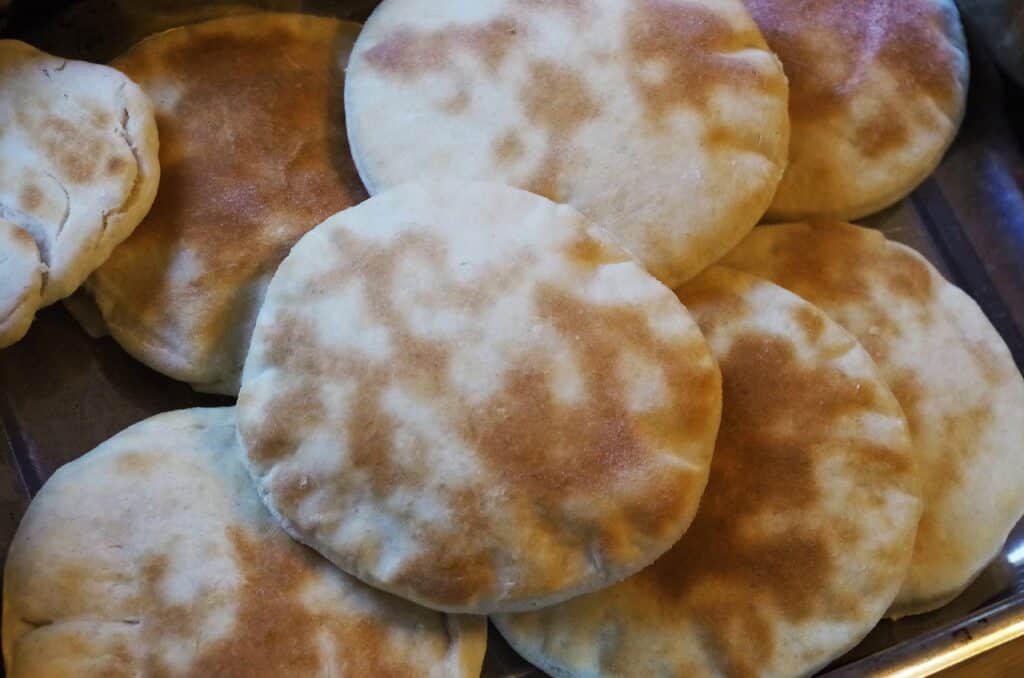You’re having breakfast, and your loyal furry friend is giving you those big, puppy dog eyes.
It seems like they want a little bit of what you’re having; after all, an occasional piece of pita bread can’t hurt, right?
Unfortunately, even though it may be tempting to share your pita bread with your pup, there are a few things you need to know before giving in.
So, can dogs eat pita bread?
While pita bread isn’t the most nutritious option for your dog, it won’t necessarily hurt them if they eat a small amount.
The biggest concern with feeding pita bread to your dog is the spices and seasonings used in preparing the dough.
These spices can range from garlic and onion, which leads to gastrointestinal upset, to sugar and salt, which can be harmful in large quantities.
This article will discuss everything you need to know about feeding pita bread to your dog, including the risks and benefits.
By the end, you’ll be able to decide whether or not pita bread is suitable for your furry friend.

What is Pita Bread for Dogs
Pita bread is a flatbread made from wheat flour, water, and yeast.
It is typically baked in a convection oven, which gives it a fluffy texture and a slightly crispy crust.
Wheat flour, the key ingredient used, is not ideal for dogs because it’s an allergen and can cause gastrointestinal upset, skin irritation, and joint pain.
For this reason, it’s essential to avoid giving pita bread to your dog if they have any allergies or sensitivities.
In addition to wheat flour, pita bread also contains water, yeast, and salt.
While these ingredients are generally safe for dogs, the spices and seasonings used in pita bread can be harmful.
Benefits of Feeding Dogs Pita Bread
Occasionally feeding your dog pita bread can have some benefits, such as:
Source of Fiber
Fiber is an essential nutrient for dogs that helps digestion and prevents constipation.
Pita bread is a good source of fiber, which keeps your dog’s digestive system healthy.
After consuming pita bread, ensure your dog has access to plenty of fresh water to help with digestion.
This, will keep your dog full and satisfied between meals.
Rich Supply of Carbohydrates
Carbohydrates are an essential energy source for dogs and are found in pita bread.
Pita bread is a good source of complex carbohydrates, which provide a slow and steady release of energy.
This makes pita bread a good option for dogs that need a little extra energy to be active and playful.
Contain Essential Vitamins and Minerals
Pita bread contains essential vitamins and minerals, such as iron and potassium, which are beneficial for dogs.
Iron helps carry oxygen to the cells and is necessary for a healthy immune system.
Potassium is an electrolyte that helps regulate blood pressure and is essential for proper muscle function.
Although pita bread isn’t the most nutrient-dense option for your dog, it’s a good source of vitamins and minerals when fed in moderation.

Dangers of Feeding Dogs Pita Bread
While there are some benefits to feeding your dog pita bread, there are also some risks that you need to consider.
The most significant risk is the potential for gastrointestinal upset, which occurs if your dog overeats pita bread or if they have an allergy or sensitivity to wheat flour.
Check out for additional dangers such as:
Choking
Your dog could choke on pita bread if it’s not cut into small pieces.
Pita bread is a hard, dense bread that can be difficult to chew, especially for smaller dogs.
Make sure to cut the pita bread into small pieces or shred it before giving it to your dog.
Allergies and Sensitivities
The wheat flour in pita bread can cause gastrointestinal upset, skin irritation, and joint pain in dogs.
If your dog has any allergies or sensitivities, it’s best to avoid feeding them pita bread.
Be keen to watch for the following symptoms of possible pita bread poisoning in dogs:
- Dry heaving
- Diarrhea
- Vomiting
- Abdominal pain
- Coughing
- Drinking a lot of water
- General weakness
- Bloating and gas
- Inflammation
- Extreme drooling
- Nausea
- Loss of appetite
- Rapid heart rate
- Pale gums
- Falling over
- Decreased or increased urination
- Vomiting blood
What Ingredients to Avoid When Making Pita Bread for Dogs?
When preparing pita bread for dogs, it’s important to avoid adding any ingredients that could be harmful such as:
- Onions
- Garlic
- Salt
- Sugar
- Nuts
- Yeast extract
- Dried fruit
- Raisins
- Xylitol
- Chocolate chips
- Any artificial sweeteners or flavorings
Factors to Consider When Feeding Dogs Pita Bread
Before feeding your dog pita bread, there are a few factors you need to take into consideration, such as:
Give Small Amounts
While pita bread is relatively safe, it’s important not to overfeed your dog to avoid gastrointestinal upset.
Start by feeding your dog a small piece of pita bread and monitoring their reaction.
If they seem to tolerate it well, slowly increase the amount of pita bread.
Type of Pita Bread
Feed your dog plain pita bread devoid of salt, sugar, or preservatives.
Remember, whole wheat pita bread is the best option for dogs, but brown rice flour or gluten-free flour can be used as substitutes for wheat flour.
Your Dog’s Health
If your dog has any health condition, it’s always best to check with your veterinarian before feeding them any new food, including pita bread.
Dogs with diabetes or other health conditions need to avoid pita bread altogether.
Bake Pita Bread Properly
As a dog parent, you want to ensure the pita bread you’re feeding your dog is safe.
One way to do this is by baking the pita bread properly.
Make sure the pita bread is cooked through and doesn’t contain any uncooked dough.
Cool Pita Bread Completely
Before giving your dog pita bread, make sure it’s cooled completely.
Eating hot pita bread can burn your dog’s mouth and throat.
Properly cooled pita bread will be easier for your dog to digest and less likely to cause gastrointestinal upset.
Can Dogs Eat Pita Bread FAQs
Can you feed pregnant dog pita bread?
There is no evidence that pita bread is harmful to pregnant dogs, but it’s always best to check with your veterinarian before feeding any new food to your pregnant dog. Nutrients found in pita bread such as folic acid, iron, and calcium are important for pregnant dogs and developing puppies.
Can my dog eat pita bread with hummus?
Hummus is generally safe for dogs to eat in small quantities. However, some hummus brands contain garlic or onion, which can be harmful to dogs. It’s best to check the ingredient list on the hummus before feeding it to your dog.
Is pita bread good for dogs with diarrhea?
Pita bread is not generally recommended for dogs with diarrhea as it can further upset their stomach.
If your dog has diarrhea, it’s best to feed them a bland diet of boiled chicken and rice until they recover.
Conclusion
Pita bread is not necessarily harmful to dogs, but there are some risks you need to consider.
Feeding your dog pita bread in moderation is generally safe, but avoid any added ingredients that could be harmful.
If your dog has any allergies or sensitivities, it’s best to avoid feeding them pita bread altogether.
If you have any concerns, consult your veterinarian.
- What Dog Breeds Have Pink Skin? - March 24, 2023
- What Are the Most Inspiring Dog Breeding Quotes? - March 20, 2023
- Can Pheromone Spray Help Improve Dog Breeding Results? - March 19, 2023








